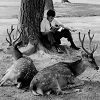Guillevic as Ecopoet: Apples, Roundness, and Affinities with Thoreau
DOI:
https://doi.org/10.51777/relief12342Keywords:
canonicity, ecopoetry, intersubjectivity, wildness, Eugène Guillevic, Henry David ThoreauAbstract
This article will explore ecopoetics by comparing notes on tonic wildness: Eugène Guillevic’s poetry collection Sphère (1963), particularly the poem “Rond”, and Henry David Thoreau’s late essay “Wild Apples” (1859-1862). It will show how both writers foreground ethics and ecology via the materiality of words, the pull of nature, and the nuances of narrative voice. I will emphasize ways in which renowned French poet Guillevic exemplifies ecopoetics, despite critics not applying this label to him. I will develop parallels between Guillevic and Thoreau, consider Guillevic’s love for the non-human, and discuss the environmental and ecological stakes of his sensuous communion with the outer world. I will analyze these writers’ lively, invigorating poetic stances, highlighting the creative responses that Guillevic invites to the natural world and intersubjectivity, habitat and humanity, the senses and ecological paths that provide a future orientation. Kin perhaps to essayist Michael Pollan, Guillevic inscribes us in the cosmos and immerses us in cyclical growth, including by celebrating apples’ implicit call to inscription in the biosphere. His meditative, dialogic voice and affinities with Thoreau help ecopoetics as a category embrace immediacy and self-awareness as well as historical and literary trends since antiquity.

Downloads
Published
Issue
Section
License
Copyright (c) 2022 Aaron Prevots

This work is licensed under a Creative Commons Attribution 4.0 International License.
Tous les articles dans RELIEF sont publiés en libre accès sous la licence Creative Commons Attribution 4.0 International License (CC-BY 4.0). Sous ce régime les auteurs conservent les droits d'auteur mais ils consentent à toute sorte d'utilisation de leur texte pourvu qu'il soit correctement cité.


